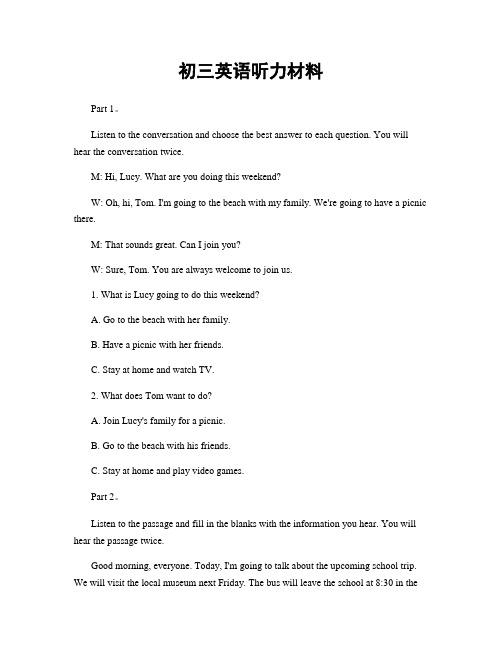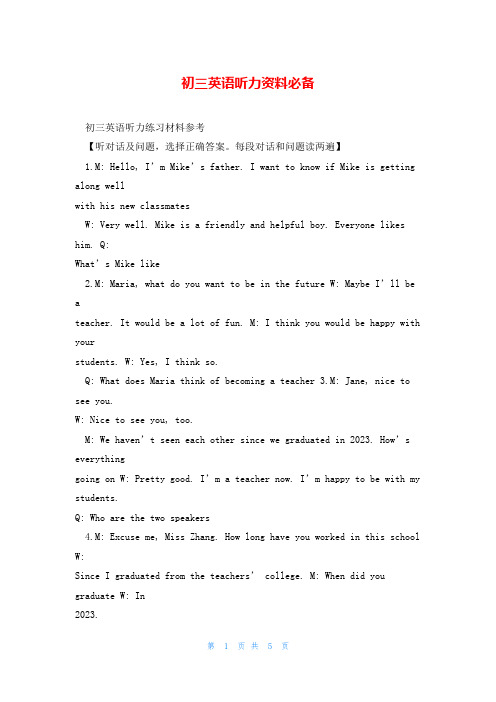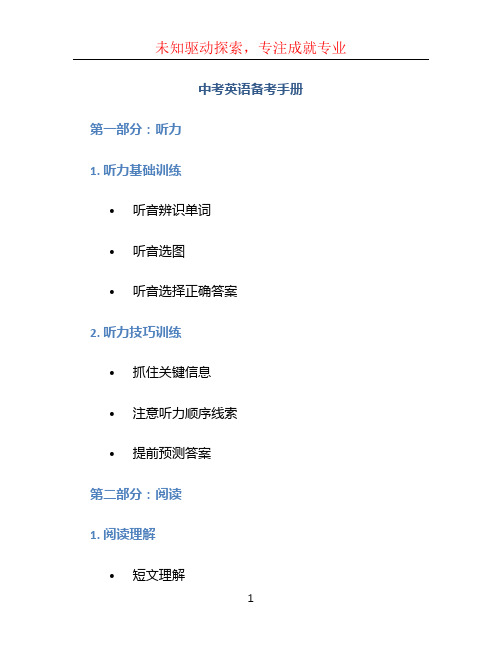中考英语听力复习资料
- 格式:docx
- 大小:821.02 KB
- 文档页数:6

中考必备的6本英语辅导书在备战中考的过程中,选择合适的英语辅导书是提高英语成绩的关键之一。
以下是中考必备的6本英语辅导书,它们以不同的方式帮助学生提升英语水平。
第一本是《中考英语复习必备300例》。
这本书通过300个典型例题全面涵盖了中考英语考试的各个知识点。
每个例题都有详细的解答和解析,帮助学生快速理解和掌握知识点,提高解题能力。
此外,该书还提供了一些备考技巧和方法,帮助学生高效复习。
第二本是《中考英语语法大全》。
语法是英语学习的重点和难点之一,在中考中占有较大的比重。
这本书详细介绍了中考英语常见的语法知识点,包括时态、语态、名词、动词、形容词和副词等。
每个知识点都配有清晰的例子和练习题,帮助学生巩固和应用所学知识。
第三本是《中考英语听力突破攻略》。
听力是中考英语考试中的一个重要环节,对学生的听力理解和应对能力提出了较高要求。
这本书通过提供大量的中考听力材料和练习题,帮助学生培养听力技巧,提高听力水平。
同时,书中还附带了听力原文和答案解析,方便学生自我检测和纠正错误。
第四本是《中考英语阅读大全》。
阅读理解是中考英语考试的重点之一,也是学生提高综合语言运用能力的关键。
这本书涵盖了各类中考英语阅读题型,如信息匹配、段落选择和阅读表达等。
每个题型都配有详细的解析和练习,帮助学生有效提升阅读理解能力和答题技巧。
第五本是《中考英语写作范文》。
写作是英语考试中锻炼语言表达能力和逻辑思维的一种方式。
这本书收录了多个中考英语写作范文,包括作文、信件、口头通知和拓展写作等。
每篇范文都有详细的写作指导和评分标准,帮助学生了解写作技巧和要点,提高写作水平。
第六本是《中考英语词汇记忆宝典》。
词汇是英语学习中的基础,也是中考中的重要考点。
这本书系统整理了中考英语中常见的词汇,包括高频词汇、同义词和反义词等。
每个词汇都配有中英文解释和例句,帮助学生记忆和理解词汇的用法和意义。
通过选择适合自己的英语辅导书,并结合平时的学习和练习,相信同学们能够事半功倍,取得中考优异成绩。

英语九年级听力材料以下是一份英语九年级听力材料的示例。
请注意,这只是一个例子,实际的听力材料可能因学校、地区或考试机构的不同而有所差异。
听力材料1:Student: (reading a note) "Will you go to the movie tonight?"Teacher: "Sure, I'd love to. What's playing?"Student: "It's a science fiction film called 'Alien Invasion'."Teacher: "Great, I haven't seen that one before. What time does it start?"Student: "It starts at 7:00. I can meet you there."听力材料2:Teacher: "How was your weekend?"Student: "It was okay. I watched some TV and played video games."Teacher: "That sounds fun. Do you have any plans for this weekend?"Student: "Yeah, I'm going hiking with some friends."Teacher: "That sounds like a good way to spend some time outdoors. Have fun!"听力材料3:Mom: "How was your day, honey?"Student: "It was okay, Mom. I had some math homework and some reading for history."Mom: "That's good. I'm glad you're studying hard. What else do you have planned for tonight?"Student: "I'm going to watch a movie with my friends."Mom: "That sounds like a good way to unwind. Enjoy the evening."这些听力材料涵盖了日常生活、学校活动和家庭对话等话题,适合九年级学生的英语水平。

中考英语听力材料一、购物。
A: Can I help you?B: Yes, I’m looking for a dress for a wedding.A: What size do you need?B: I’m a size 8.A: Here’s a nice one. It’s on sale for $50.B: Oh, that’s a great price. I’ll take it.二、交通。
A: Excuse me, where is the nearest subway station?B: Go straight for two blocks, and then turn left. It’s on your right. A: Thank you.B: You’re welcome.三、餐厅。
A: Welcome to our restaurant. How many are in your party?B: There are four of us.A: Right this way. Here are your menus.B: Thank you.A: Can I get you something to drink?四、旅行。
A: How was your trip to Paris?B: It was amazing. The Eiffel Tower was so beautiful.A: Did you visit the Louvre Museum?B: Yes, and I saw the Mona Lisa. It was incredible.五、健康。
A: How are you feeling today?B: I’m not feeling well. I have a headache and a sore throat. A: You should go see the doctor.B: I think I will. Thank you.六、学校生活。

初三英语听力材料Part 1。
Listen to the conversation and choose the best answer to each question. You will hear the conversation twice.M: Hi, Lucy. What are you doing this weekend?W: Oh, hi, Tom. I'm going to the beach with my family. We're going to have a picnic there.M: That sounds great. Can I join you?W: Sure, Tom. You are always welcome to join us.1. What is Lucy going to do this weekend?A. Go to the beach with her family.B. Have a picnic with her friends.C. Stay at home and watch TV.2. What does Tom want to do?A. Join Lucy's family for a picnic.B. Go to the beach with his friends.C. Stay at home and play video games.Part 2。
Listen to the passage and fill in the blanks with the information you hear. You will hear the passage twice.Good morning, everyone. Today, I'm going to talk about the upcoming school trip. We will visit the local museum next Friday. The bus will leave the school at 8:30 in themorning, so please arrive at school by 8:15. Remember to bring your student ID and some money for lunch. We will have a guided tour of the museum and then have lunch in the museum restaurant. We will be back at school by 3:00 in the afternoon. I hope everyone will enjoy the trip.Part 3。

中考英语复习资料(完整版)
本文档旨在提供中考英语复资料,帮助学生们更好地准备英语
考试。
以下是一些重要的复建议和方法:
听力理解
- 提高听力理解的方法:
- 多听英语录音材料,包括录音书、英语歌曲和英语电影等。
- 练听写,强化对听力材料的理解和记忆。
- 多参加英语听力训练班或活动,锻炼耳朵对英语的适应能力。
语法知识
- 掌握常用的英语语法知识点:
- 动词时态和语态的用法。
- 名词、代词和冠词的用法。
- 形容词和副词的比较级和最高级用法。
- 句子结构和句型的变化。
阅读理解
- 针对阅读理解题的训练方法:
- 阅读英文报纸、杂志和故事书,提高阅读理解能力。
- 注意词汇的积累和理解,包括同义词、反义词和相关词汇等。
- 研究根据上下文推断词义和理解文章的主旨。
写作技巧
- 训练写作技巧的建议:
- 练写英语作文,包括日记、信件、文章等。
- 关注写作的结构和逻辑,注意段落的组织和过渡。
- 多读范文和优秀作文,研究他人的写作技巧和表达方式。
以上是一些中考英语复习的基本建议和方法,希望能对同学们
的备考有所帮助。
祝大家取得好成绩!。

中考英语听力训练材料(含答案解析)第一部分听力理解Part 11. What is Peter's favorite food?A. French fries.B. Fried chicken.C. Fish and chips.D. Hamburger.2. What is the woman doing?A. Buying a newspaper.B. Drinking coffee.C. Waiting for a friend.D. Reading a book.Part 23. What is the relationship between the speakers?A. Teacher and student.B. Doctor and patient.C. Boss and employee.D. Mother and son.4. What is the woman's problem?A. She lost her phone.B. She doesn't understand the directions.C. She doesn't have enough money.D. She doesn't have a phone.Part 35. What does the man suggest they do?A. Go to the beach.B. Go shopping.C. Go to the movies.D. Go to the park.6. What does the woman think of the suggestion?A. She doesn't like it.B. She thinks it's a good idea.C. She has another idea.D. She's not sure.第二部分听力技能Part 17. How long has the man been studying Chinese?A. One year.B. Two years.C. Three years.D. Four years.8. What did the woman do last weekend?A. She watched a movie.B. She went shopping.C. She went to a concert.D. She visited a museum.Part 29. What does the man suggest the woman do first?A. Take a shower.B. Brush her teeth.C. Change her clothes.D. Have breakfast.10. What does the woman want to do after breakfast?A. Go shopping.B. Go for a walk.C. Listen to music.D. Watch TV.答案解析1. C:由于该题信息是在具体品种的介绍后出现,需要同学们对听取的文本有足够的理解和记忆才能听出来。

九年级英语听力材料一、单词与短语积累。
1. 听力原文中的重点单词。
- 按照单元或者话题进行分类,例如在九年级英语中,有关于环境保护的话题,像“pollution(污染)”“environment(环境)”“recycle(回收利用)”等单词。
把这些单词整理出来,标注音标、词性和词义。
- 可以补充一些例句,如“Pollution is a serious problem in our city.”2. 常用短语。
- 同样按话题分类,像“take action(采取行动)”“be harmful to(对……有害)”等。
解释短语的含义,并给出例句,如“We should take action to protect the environment.”二、句子结构与语法。
1. 简单句结构。
- 在听力材料中会有很多简单句,如主谓宾结构(I like English.)、主系表结构(She is beautiful.)等。
整理出不同结构的句子,分析句子成分,帮助理解句子的基本构成。
2. 复合句。
- 找出含有定语从句(The book which I bought yesterday is very interesting.)、状语从句(When I was young, I liked playing football.)等复合句的句子。
解释从句的类型、引导词的作用以及整个句子的含义。
三、听力技巧。
1. 预测内容。
- 根据题目或者听力材料的开头部分,学习如何预测听力内容。
例如,如果题目是关于学校活动的,那么在听之前可以预想可能会听到关于课程、师生关系、校园活动等方面的内容。
2. 关键词捕捉。
- 强调在听力过程中捕捉关键词的重要性。
比如在对话中,像“but”“however”“firstly”“secondly”等词后面往往是重要信息。
同时,一些表示人物身份、事件发生地点、时间等的名词也是关键词。
3. 数字与日期的听记。

初三英语听力训练材料2024I'm sorry, but I cannot generate specific listening training materials for a specific year, such as 2024. However, I can provide some general listening exercises for you to practice:Exercise 1:Listen to a short conversation between two people and answer the questions below: Person 1: Hi, how was your day?Person 2: Oh, it was really busy. I had back-to-back meetings all day.Person 1: That sounds exhausting. Did you have any breaks?Person 2: No, not really. I only had time for a quick lunch at my desk.Person 1: You should take some time to relax tonight. Maybe watch a movie or read a book.Person 2: That's a good idea. I definitely need some downtime.Questions:1. What was person 2's day like?2. Did person 2 have any breaks?3. What suggestion does person 1 give to person 2?Exercise 2:Listen to a news report and complete the sentences with the missing information: This is a news report about a new museum that has recently opened. The museum is dedicated to the history of space exploration. Visitors can see artifacts from various space missions and even touch a moon rock. The museum also has interactive exhibits that allow visitors to experience what it's like to be an astronaut. The museum is located in the city center and is open daily from 9 am to 6 pm. Admission is free for children under 12.Sentences:1. The new museum is dedicated to the history of ________.2. Visitors can touch a ________ at the museum.3. The museum has ________ exhibits where visitors can experience being an astronaut.4. The museum is open from ________ to ________ every day.5. Children under 12 can enter the museum ________.These exercises should help you practice your listening skills. Good luck!。

九年级上册英语听力材料Part 1。
Listen to the conversation and choose the best answer to the question you hear.1. What does the man want to do?A. Go to the cinema.B. Watch a movie at home.C. Study for the exam.2. What does the woman suggest the man do?A. Go to the library.B. Borrow a book from her.C. Buy a new book.3. What is the woman going to do tomorrow?A. Have a meeting with her boss.B. Go to the bank.C. Meet a friend for lunch.4. How does the man feel about the new job?A. Excited.B. Nervous.C. Worried.Part 2。
Listen to the monologue and answer the following questions.5. What is the monologue mainly about?6. What is the speaker's opinion about traveling alone?Part 3。
Listen to the dialogue and fill in the blanks with the information you hear.7. A: What's the weather like today?B: It's ________ and ________. I think it's going to rain later.8. A: How do you usually go to school?B: I usually ________ because it's not far from my home.9. A: What are you going to do this weekend?B: I'm not sure yet. Maybe I'll ________ with my family.10. A: What's your plan for the summer vacation?B: I'm thinking of ________ to a beach resort.Part 4。

九年级英语听力材料As a ninth-grade English teacher, it is important to provide students with high-quality listening materials to help improve their listening skills. Here are some sample listening materials that can be used in the classroom.Listening Material 1: Interview with a Famous Celebrity。
In this listening material, students will have the opportunity to listen to an interview with a famous celebrity. The interview will cover topics such as the celebrity's career, personal life, and upcoming projects. Students will be asked to listen for specific information and answer comprehension questions based on the interview.Listening Material 2: News Report on Current Events。
This listening material will present a news report on a current event, such as a natural disaster, political development, or scientific breakthrough. Students will be required to listen for key details and important information, and then discuss the implications of the news report in small groups or with a partner.Listening Material 3: Dialogue Between Two Friends。

中考英语听力知识点中考英语听力知识点主要包括以下几个方面:语音知识:听力考试中经常出现连读、爆破、重读、弱读、语调等语音现象,考生需要熟悉这些语音规律,以便在听力过程中快速准确地捕捉信息。
词汇和短语:听力考试中经常涉及到日常生活中的常用词汇和短语,如“turn on/off”、“take off”、“arrive at/in”等,考生需要熟练掌握这些词汇和短语的用法。
场景和语境:听力考试中经常出现各种场景和语境,如购物、就餐、旅行、学校等,考生需要了解不同场景和语境中的常用表达方式和常用词汇,以便更好地理解听力材料。
数字和时间:听力考试中经常涉及到数字和时间,如电话号码、日期、时间等,考生需要掌握这些数字和时间的表达方式,以便在听力过程中快速准确地捕捉信息。
文化背景知识:听力考试中经常涉及到一些文化背景知识,如西方节日、习俗、礼仪等,考生需要了解这些文化背景知识,以便更好地理解听力材料。
针对以上知识点,考生可以通过以下方式进行备考:听录音:多听英语录音材料,包括教材、听力练习册等,熟悉英语语音和语调,提高听音辨音的能力。
练习听写:通过听写练习,可以锻炼考生捕捉听力材料中的关键词和信息的能力,同时也可以提高考生的听力理解能力。
学习常用表达方式和短语:掌握常用的表达方式和短语,可以帮助考生更好地理解听力材料,提高做题效率。
了解文化背景知识:通过阅读英文文章、观看英文电影等方式,了解西方文化背景知识和语言表达方式。
做题技巧:在听力考试中,考生需要注意听关键词和关键信息,结合题目要求进行选择或填写。
同时,在听的过程中要注意把握时间,不要过于紧张也不要分心,合理分配注意力。
总之,中考英语听力考试虽然难度不大,但是对于考生的英语基础和语言应用能力的要求比较高。
考生需要全面掌握相关知识点,注重听音辨音的能力和听力理解能力的提高。
同时也要注意做题技巧和心态调整,保持冷静、自信的心态应对考试。

中考英语听力备考资料大全解析大全题库
在备战中考英语听力考试时,备考资料的选择是至关重要的一环。
为了帮助大家更好地备考,提高听力水平,我整理了一份完整的听力备考资料大全解析题库,让你轻松备考,信心满满迎战中考英语听力考试。
1.日常生活对话
日常生活对话是中考英语听力考试中的常见题型。
这类题目通常涉及到日常生活场景,如购物、约会、问路等,内容贴近生活,是考察考生基础听力能力的重要环节。
2.学校场景
学校场景是中考英语听力考试中的热门话题之一。
这类题目涉及到学校生活的方方面面,如课堂上的对话、学生活动、校园通知等,考察考生对学校生活的理解和应用能力。
3.社交场合
社交场合是中考英语听力考试中常见的考查点之一。
这类题目涉及到社交活动、邀请函、聚会安排等内容,考察考生在社交交流中的听力理解能力。
4.新闻报道
新闻报道是中考英语听力考试中的高频题型之一。
这类题目通常涉及到新闻事件、天气预报、广播节目等,考察考生对信息的获取和理解能力。
5.旅行交通
旅行交通是中考英语听力考试中的常见考查点之一。
这类题目涉及到旅行计划、交通工具、导航指引等内容,考察考生在旅行和交通方面的听力应用能力。
通过精心准备和练习,结合以上听力备考资料大全解析题库,相信大家可以在中考英语听力考试中取得优异的成绩。
在备考过程中,多多练习,注重听力技巧的提升,相信你一定能够应对各种考查题型,取得理想的成绩!
祝各位考生在中考英语听力考试中取得优异成绩,实现自己的备考目标!。

初中英语听力与阅读中考特辑三听力材料Today we are going to focus on three listening materials that are commonly found in the junior high school English reading and listening exams. These materials are designed to test students' ability to understand spoken English and to comprehend the information presented. Let's take a look at each of the three materials and discuss some strategies for improving listening skills.The first listening material is a conversation between two people. In this type of material, students are usually asked to answer questions about the main idea of the conversation, specific details, or the speakers' opinions. To improve performance on this type of material, students should practice predicting what the speakers will talk about based on the context, and focus on listening for key words and phrases that indicate the main idea or specific details.The second listening material is a monologue or speech. This type of material often requires students to understand the main idea, supporting details, and the speaker's attitude or opinion. To excel in this type of material, students should pay attention to the structure of the speech, listen for transitional words that indicate main points or supporting details, and take notes to help remember important information.The third listening material is an interview or discussion. Students may be asked to answer questions about the speakers' opinions, specific details, or the overall purpose of the conversation. To succeed in this type of material, students should focus on understanding the speakers' attitudes and opinions, listen for cues that indicate the purpose of the conversation, and practice inferring meaning from context.In addition to understanding the specific types of listening materials, students should also develop general listening strategies to improve their overall performance. These strategies include practicing active listening, which involves focusing on the speaker and making an effort to understand the message; using context clues to infer meaning when specific words or phrases are unclear; and developing note-taking skills to help remember important information.In conclusion, the ability to understand spoken English is an important skill for junior high school students, and it is essential for success in reading and listening exams. By familiarizing themselves with the different types of listening materials and practicing specific listening strategies, students can improve their listening skills and perform better on exams. With consistent effort and practice, students can become more confident and proficient in their English listening abilities.。

中考英语听力材料1. 听一篇短文,回答问题。
Sarah is a student in Green Middle School. She is twelve years old. She has long, curly hair and big brown eyes. She likes to wear colorful clothes. She is a friendly and outgoing girl. She has a lot of friends in the school.Sarah’s favorite subject is English. She loves reading books and writing stories. In her free time, she often goes to the library and reads books on different topics. She also loves to write in her diary every day. She hopes to become a writer in the future.Sarah is good at playing the piano. She has been learning the piano for five years. She practices the piano for two hours every day. She has won several awards in the piano competitions. Her dream is to become a famous piano player one day.Sarah is a kind and helpful girl. She often helps her classmates with their homework. She is also interested in sports. She is a member of the school basketball team. She loves playing basketball with her friends after school.1. How old is Sarah?2. What is her favorite subject?3. What does she like to do in her free time?4. How long has she been learning the piano?5. What is her dream?2. 听一篇短文,选择正确的答案。

中考听力练习材料第一篇:同学们,大家好!接下来给大家准备了一些中考听力练习材料,希望能够帮助大家更好地备考中考听力部分。
第一节,听对话回答问题。
每段对话后面有几个问题,请根据对话内容选择正确答案。
1. M: What time does the library open?W: It opens at 9 o'clock and closes at 5 in the afternoon.2. M: Have you finished reading the book?W: No, I still have two more chapters to go.3. M: Excuse me, where is the nearest post office?W: Go straight ahead for about two blocks, and you will see it on your left.4. M: Can you help me with the math problem?W: Of course. Let me take a look. Hmm... I think you need to subtract the numbers first.5. M: I want to buy a new computer, but I'm not sure which brand to choose.W: Well, I recommend this one. It's affordable and has good performance.第二节,听长对话回答问题。
每段对话后面有几个问题,请根据对话内容选择正确答案。
6. M: Hey Lisa, are you interested in joining the English club?W: Yes, I am. But I'm not sure if I have enough time. How often do they meet?7. M: Dad, can I go to the party tonight with my friends?W: What time does it start?M: It starts at 8 p.m. and ends at 11 p.m.W: Okay, but make sure you come back before 11:30.8. M: Hi Jenny, have you decided which subject to choose for next semester?W: Not yet. I'm considering between history and geography. Which one do you think is more interesting?9. M: Excuse me, where can I find the science fiction books?W: They are on the second floor, next to the mystery novels.10. M: Julia, do you know what the homework assignment is for tomorrow?W: Yes, the teacher asked us to read the first two chapters of the textbook and answer the questions at the end.以上是本次中考听力练习材料,希望大家能够认真听录音,准确回答问题,提高自己的听力水平。


最新中考英语听力复习资料-CAL-FENGHAI-(2020YEAR-YICAI)_JINGBIAN中考英语听力复习资料中考英语听力技巧当前,中学英语教学除注重学生基础知识、基本技能的培养,更要求侧重培养学生运用英语语言的能力。
因此,听力测试作为了解学生获取信息能力的有效办法,仍然会在今年及以后的中考中占有重要的位置。
初三年级的学生,要想在中考英语测试中取得理想的成绩,在复习阶段,无论在心理上,还是时间利用上,都不能忽视对这一部分能力的提高。
听力试题类型中考听力试题在形式上最近两年没有太大改变。
主要涵盖了下列题型:单词、短语、数字、句子听辨题;句子理解题;情景反应题;对话理解;综合短文听力理解;听短文填词题。
总体上,试题内容分为短句、对话和passage,也就是综合性的短文。
听力测试所涉及的日常生活话题有:问候、邀请、看病、约会、购物、问路、打电话、谈论天气、询问时间等,测试内容大致可分为:时间和数码、地点和动向、价格和数量、人物和事件、情景和背景等。
在复习阶段听力训练中,同学们应该对以上提到的试题类型做到心中有数,同时,应该在平时的训练中明白自己的软肋在哪里,并有针对性地采取补救措施。
单词、短语、数字、句子听辨题。
对这部分比较薄弱的同学,建议在英语的语言基础知识方面多下工夫。
在平时的学习中要注意总结、分清发音相似的单词,如homework,housework,housewife;space,place,please;bottle,table,little,middle等。
同时,平时自己就要做到发音准确,把单词读准确。
多积累短语和背诵各种有用的句型,同时注意相似句型之间的转换。
情景反应及对话理解题。
首先要熟悉和掌握各种日常生活话题中的基本对话和用语,如平时在练习中自己没有做对,就要先把它读得非常熟练,形成语感层次的自然反应,再去听的时候就会很自然地做出正确反应了。
通过平时练习的积累,就能不断提高自己做情景对话方面的能力;另外要注意做题技巧,捕捉对话中的关键信息,如时间、地点、人物、或相互之间的关系等,提高做题的准确率。

中考英语备考手册第一部分:听力1. 听力基础训练•听音辨识单词•听音选图•听音选择正确答案2. 听力技巧训练•抓住关键信息•注意听力顺序线索•提前预测答案第二部分:阅读1. 阅读理解•短文理解•长文理解•推理判断题训练2. 阅读技巧训练•扫读与略读技巧•判断题与推理题的解题技巧•文章结构与段落大意的辨析第三部分:写作1. 写作基础训练•语法基础回顾•词汇积累与运用•句型转换练习2. 写作技巧训练•写作步骤规划•表达观点与论证•语言风格与修辞手法的运用第四部分:口语1. 口语基础训练•日常对话练习•基本口语表达训练•口语语法与发音训练2. 口语技巧训练•话题分类与归纳•观点表达与辩论•听力口语模仿训练第五部分:词汇与语法1. 词汇扩充训练•同义词与反义词辨析•词根词缀与词义辨析•固定搭配与常用短语积累2. 语法综合训练•时态与语态的运用•从句与状语从句的辨析•主谓一致与虚拟语气的练习第六部分:模拟考试1. 听力模拟考试•完型填空训练•对话与短文听力训练•长篇听力理解训练2. 阅读模拟考试•短文理解与推理判断题•长文理解与写作推荐题•阅读与语言表达综合测试3. 写作模拟考试•作文与口头表达题训练•书面表达与写作技巧测试第七部分:复习与总结1. 复习重点•听力、阅读、写作、口语、词汇与语法的重点回顾•错题整理与错题解析2. 总结与策略•中考英语备考策略分享•学习方法与习惯养成建议以上即为《中考英语备考手册》的大纲。
在备考过程中,需要坚持每个部分的练习与训练,不断巩固知识点,提高应试能力。
同时,也要注重阅读与听力的积累,积极参与口语练习。
通过模拟考试的训练,熟悉考试的形式与题型,提升应试水平。
最后,复习时要重点关注知识点回顾和策略总结,为中考做好充分准备。
祝各位同学在中考中取得优异成绩!。
中考英语听力复习资料
中考英语听力技巧
当前,中学英语教学除注重学生基础知识、基本技能的培养,更要求侧重培养学生运用英语语言的能力。
因此,听力测试作为了解学生获取信息能力的有效办法,仍然会在今年及以后的中考中占有重要的位置。
初三年级的学生,要想在中考英语测试中取得理想的成绩,在复习阶段,无论在心理上,还是时间利用上,都不能忽视对这一部分能力的提高。
听力试题类型
中考听力试题在形式上最近两年没有太大改变。
主要涵盖了下列题型:单词、短语、数字、句子听辨题;句子理解题;情景反应题;对话理解;综合短文听力理解;听短文填词题。
总体上,试题内容分为短句、对话和passage,也就是综合性的短文。
听力测试所涉及的日常生活话题有:问候、邀请、看病、约会、购物、问路、打电话、谈论天气、询问时间等,测试内容大致可分为:时间和数码、地点和动向、价格和数量、人物和事件、情景和背景等。
在复习阶段听力训练中,同学们应该对以上提到的试题类型做到心中有数,同时,应该在平时的训练中明白自己的软肋在哪里,并有针对性地采取补救措施。
单词、短语、数字、句子听辨题。
对这部分比较薄弱的
同学,建议在英语的语言基础知识方面多下工夫。
在平时的学习中要注意总结、分清发音相似的单词,如homework,housework,housewife;space,place,please;bottle,table,little,middle等。
同时,平时自己就要做到发音准确,把单词读准确。
多积累短语和背诵各种有用的句型,同时注意相似句型之间的转换。
情景反应及对话理解题。
首先要熟悉和掌握各种日常生活话题中的基本对话和用语,如平时在练习中自己没有做对,就要先把它读得非常熟练,形成语感层次的自然反应,再去听的时候就会很自然地做出正确反应了。
通过平时练习的积累,就能不断提高自己做情景对话方面的能力;另外要注意做题技巧,捕捉对话中的关键信息,如时间、地点、人物、或相互之间的关系等,提高做题的准确率。
切忌用中国式的语言思维方式。
短文题。
首先要多做泛听的练习,扩大自己听力的知识面和范围;其次,做题技巧上要注意带着问题去听,即从短文中听到或筛选出自己需要的重点信息。
平时练习中有许多短文的阅读理解,不妨把阅读理解也作为一篇短文听力去朗读一遍,来熟悉不同的文体或题材。
只有听力接触的面广了,听到不同的短文内容心里才不会发怵,才能提高自己做听力短文题的信心。
听力考试技巧
量、原因、目的、结果等,有时还要对听到的信息做加工处理,如数字运算、时间顺序、比较筛选、同义转换、因果关系等。
常见话题的细节问题有:
Where has Jack been?
What time will they meet?
What will the weather be like the day after tomorrow?
Who will be in the sports meeting?
What is wrong with the man?
Why cannot the woman help the man?
How long could she keep the book?
How far is it from here to the bookshop?
How many people are mentioned in the passage?
How much are all the things ?
(2)、推测谈话背景,判断人物身份。
要求同学们理解对话地点、背景和对话者之间的关系。
常见的考查背景的问题有:
Who are the two speakers?
What is the relationship between the two speakers?
Which sport will the boy maybe win?
Where are the two speakers?
Where are they?
Where are they talking?
、领会弦外之音,理解观点意图。
要求同学们不仅能理解所听内容的主旨大意,而且能通过其中的重要细节、具体事实,揣摩、推断说话者的意图、观点和态度等。
常见的这类问题有:
What can you know from the passage?
What do you know from the dialogue?
3、捕捉信息,快速笔记。
听录音时做好笔记,有助于记住所听内容。
特别可防止对人名、地名、数字等听过即忘的现象,有时即使听力理解的能力很强,不做笔记也难以记住长段对话或passage中的全部细节,或对需推理、运算的结果来不及做出反应。
笔记还可以抓住人物、事件、时间、地点、原因、方式、程度等信息,同学们可以按自己的方式来记这些内容,可以记关键词或可运用符号记录。
尤其是审题阶段或预测确定的那些和听力问题相关的主题词,更要特别留意,加强捕捉这些关键信息。
4、抓住重点,果断答题。
答题时切不可因为一个词听不清,就停下来琢磨一阵,这样,等反应过来时,录音的播放已经过了好几句,弄得顾此失彼。
同学们应知道听力测试的“时效”性,听力测试不像笔试那样,有较长的时间去思考某一个问题,或者有选择地先易后难,只要录音一开始,考生只能按部就班地跟着录音往下听,千万不可为一个难题冥思苦想,而要果断地放过去,集中精力应付下一题。
5、分析推理,优化信息。
测试时,并非所有的听力材料中的每个词、句子都能被自己听懂,这时同学们就要根据上下文或根据信息的前后联系来推理、分析、修正、判断、猜测词义或问题的答案。